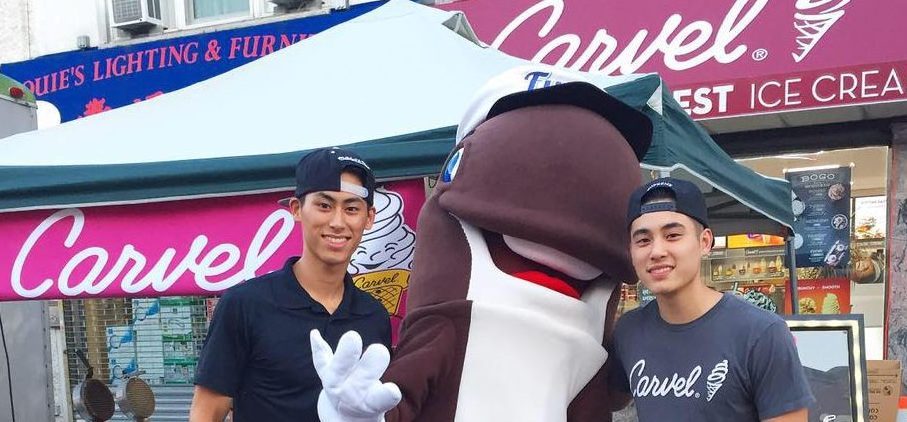Entrepreneurial Millennials: Why the Franchise Environment Is So Enticing to Them
9 Min Read By MRM Staff

As a student at Missouri Western State University’s Craig School of Business, Allie Canaday won an entrepreneurship competition that awarded her a franchise in Omaha. She entered the contest because she desired the challenge that comes with owning your own business.
“I liked knowing that I would be able to control my success through a venture that would be my own,” she told Modern Restaurant Management magazine. “It definitely changed the course of my career path. I was in my senior year of college and had little interest in the job opportunities I had seen advertised throughout the school. Nothing else had caught my interest like the opportunity of the entrepreneurship class. However, had it not been for that opportunity I would not have been able to pursue the franchise environment simply because the lack of funding.
After selling the business a year later, she moved back to her hometown in Utah and opened an Auntie Anne’s franchise at the Outlets at Traverse Mountain with her husband, Matt.
As a teenager, Perry Boon worked at his father’s store managing inventory. After working jobs in finance and education, when he decided to follow in his father’s footsteps and open a location in Brooklyn’s Bensonhurst neighborhood.
“I have always wanted to follow my father’s footsteps,” he said. “For me it was more about when I wanted to than why. I wanted to work in the corporate world and learn/absorb as much as I can hoping to reach high positions; and financial salary in the city before opening my own business. After two years of working for others it made me realize that following that plan will set me back on my overall goals of becoming a successful entrepreneur.”
Alexander Johnson was on his way to law school at a time when admissions were being impacted by the recession and many people were choosing to go back to school to get advanced degrees.
“I was discouraged by this and the tremendous amount of debt I would take on as a result of attending law school,” he said. “My decision to not attend law school and instead pursue entrepreneurship and business ownership was one of the best I’ve ever made.”
Johnson is a now multi-unit operator who owns a total of eight Cinnabon and Auntie Anne’s locations across the Bay Area. He is also a member and treasurer of the Cinnabon Franchise Advisory Council.
Modern Restaurant Management discussed entrepreneurial spirit and the lure of the franchise environment with these millennial business owners.
Why did you choose the franchise environment/to be an entrepreneur?
Perry Boon, Carvel: I choose to be an entrepreneur for numerous reasons. First, I wanted to lead my own business rather than to work on someone else’s. Also, I was most experienced and familiar with the Carvel franchise which I grew to be passionate about. I believe franchising is the best option when opening up your own business. You are solely responsible for your own success with the support of a great corporation.
Alexander Johnson, Cinnabon: I do not consider myself to be a creative person. Because of that fact, I like the idea of franchising because I am able to take the idea of someone else and run it by my own means of management and make it the most efficient reiteration of that idea. In essence, I like not having to “reinvent the wheel,” but in fact, taking someone else’s wheel and making it the fastest and most efficient wheel possible.
Allie Canaday, Auntie Anne’s: I chose to be an entrepreneur and the franchise environment found me. I was presented with an opportunity to first own a Rocky Mountain Chocolate Factory franchise. Fortunately I just happened to love chocolate! Because of the success my husband and I saw in the chocolate business, we were able to get funding for a second franchise with Auntie Anne’s which is equally delicious. I enjoy the structure that comes with a franchise system along with the brand awareness. Consumers have so many choices in today’s world. Our sales are helped by a great brand and we are able to use our business knowledge in conjunction with those who have been with the brand numerous years. It’s a recipe for success.
Why did you select the franchise you now own and what about it appealed to you?
Boon: I chose Carvel because I had the most experienced and knowledge of the business. I was already managing my father’s locations on the weekends. I also enjoy the dessert industry and the customers it brings in. Ice cream is fun and delicious – how could you go wrong with that?

Johnson: My parents had been Auntie Anne’s franchisees for quite some time. We were approached to do an Auntie Anne’s/Cinnabon hybrid store and I have been lucky and blessed to be a part of the Cinnabon family ever since. There is and continues to be so much opportunity with the brand in terms of performance and growth. In 2013, I became part of the Cinnabon Franchise Advisory Council, which I continue to serve on to this day. The FAC allows for an intimate relationship between a select few of us franchisees and the Cinnabon executive team. I am so impressed with both our past and present leadership team and my fellow franchisee colleagues. It is an honor to work with them and they continue to inspire and motivate me to be the very best.
Canaday: Our first franchise of Rocky Mountain Chocolate Factory (RMCF) was selected because of a partnership between a generous man named Steven Craig and RMCF VP of Franchising, Greg Pope. It was their combined effort that allowed students to have the opportunity to own a business straight from graduating college. We selected Auntie Anne’s as our own choice in a second franchise because of its appeal in an Outlet environment. My husband and I are fortunate to own 2 businesses within the same outdoor center at the Outlets at Traverse Mountain in Lehi, UT. There was a need in the snack food market and we were familiar with the Auntie Anne’s brand and loved the product. We thought it would be a great compliment to the mall and it has been growing in sales since opening Dec. 2014.
What do you love about what you do and what challenges you the most?
Boon: I love developing relationships with my community and getting creative with the products we offer. I also love being a leader of a team that is passionate about the job. The most challenging thing for me is being able to pave a road for myself, and my employees to have a future beyond working in the retail location.
Johnson: Overall, I enjoy being a Cinnabon franchisee because of the nostalgia and fun our product brings to our guests. I love watching new and old guests alike indulge in a Cinnabon and instantly recognizing that moment as the best part of their day. I also find joy in opening new stores and acquiring destressed stores and turning them around. That takes a lot of work and I’m thankful to have an outstanding management team to make that happen. I love the daily interaction I have with my team and our guests. This business is truly a “people” business.
Canaday: I love that every day is different and brings new challenges. When you work in food retail and with the public, there is never a dull moment, good or bad! The biggest challenge would be owning a small business in America today. Government regulations on both employee benefits and minimum wage (while it hasn’t affected Utah yet) make employees the toughest aspect. Payroll is a constant struggle because of turnover in our line of work plus competing with the wages your neighbors are paying. It is bittersweet to have the help but to pay such a high price for it.
Do you feel millennials are attracted to entrepreneurism? If so, why?
Boon: Yes, I do because I believe we have the ability to dream big, and want more than our parents have already given us and worked for. A lot of my friends have already opened their own businesses and have already created a competitive drive for me.
Johnson: Absolutely, everyone wants to be the next Mark Zuckerberg! Many millennials are attracted to the idea of working for themselves and are able to see their ideas come to life thanks to technology and an abundance of investment capital.

Canaday: I do feel millennials are attracted to entrepreneurism! With that, I do feel there are two types of millennials – the “go-getters” and the entitled. I feel the go-getters of my generation see the opportunity and crave to build their own future.
What are challenges facing the franchise environment today?
Boon: In my opinion, our biggest challenge today is competing against new, innovative companies that are catching the interest and taste buds of the new generation. As a franchise, we don’t want to stray too far from where we originated, but rather find a way to speak to the young minds and pull their business in. Slowly, the elder generations will lose consumer buying power and, ultimately, the future of the franchise lies in the hands of the current consumers. We do not want to be forgotten with the passing time and generation. We need to be using modern day technology and marketing concepts to stay on top of the industry.
Johnson: Increasing labor costs, decreasing traffic counts, and the race to stay relevant and differentiated among competitors. Most franchises are built on an economic business model that is profitable if you can keep your prime costs within a certain margin. If labor, food costs, rent, etc. exceed these margins, your profit gets cut. Most franchises run a very slim profit margin so even the smallest increases in operating costs are felt on the bottom line. When you couple that with decreasing transaction counts (decreased sales) you begin to see a pretty dark reality. However, it is not all doom and gloom. We leverage marketing and innovative solutions like loyalty programs and new restaurant technology to stay relevant and differentiated in the minds of our guests. This helps drive transaction counts up and increase sales.
Canaday: I can only speak on my opinions and experiences of food retail franchises. A challenge facing the food retail franchise system today is competition in the market. Also, location plays a huge roll for opportunity as well. Online retailers pull consumers with their convenience. Less and less people flock to malls for the shopping experience. As previously stated, I believe government regulations are also a hindrance on the small business franchise owner.
What do you feel are common misconceptions about franchising and how do you combat them?
Boon: I think common misconceptions are that franchising is old-fashioned and that franchise corporations are making it hard for franchisees to make a profit. This is why some millennials want to start up new ideas and create new products instead of franchising. I look past that by learning from my father, trying to understand the corporate relationship, and keeping my eyes on the overall prize. I keep an open mind and try to build the franchise image and brand starting with my location. My success is the brand’s success.
Johnson: The greatest misconception people have about franchising is that they believe the franchisor and franchisee are the same thing. What I mean to say is that people do not realize that franchisees own and manage their locations, not the franchisor. Franchisees have much tighter budgets and run much smaller profit margins than the franchisor. People also tend to think owning/managing a franchise is easy and that you can become wildly rich from it. The truth is, you can, but it doesn’t happen overnight or with lack of actually working. Franchising takes a lot of hands on, hard work. I know many successful franchisees who are that way because you regularly see them mopping floors, washing dishes, serving guests, etc.
Canaday: I would say the biggest issue we face is that a lot of people don’t realize that we are separately owned entities. We combat this by letting them know we are locally owned and operated and giving them top-notch customer service so they choose to visit our location over others.
What are challenges facing the restaurant industry?
Boon: I believe minimum wage is a huge challenge for the industry. Raising the wage would require businesses to cut costs or raise their prices, and many will be faced with passing the cost on to consumers. The increased salary parity among seasoned and new workers could discourage people from working harder or climbing the chain of command. And eventually, it will be harder for prospective employees to get a retail job, as applicants will need to bring experience on top of education and connections.
Johnson: Increasing labor costs and anti-business friendly legislation that is aimed at making it much harder to manage and control one’s own business.
As a multi-unit operator, you are able to realize economies of scale. I am able to leverage my team across our entire portfolio of stores. For instance, I am able to move team members from one store to another when the opportunity or need arises thus making managing labor much more easy. The same can be said for the goods we purchase from our vendors. If we need to move product from one store to another it is much easier and cheaper than having to have extra product shipped from the vendor. As for growth, I think it is important not to grow just for growth’s sake. I am careful to build infrastructure into the business first, to make sure it can sustain added growth. Making sure you have reliable HR and accounting resources and a management team that wants to grow with you are just as important as having the opportunity and capital to grow. I am very methodical and strategic in choosing which new locations to pursue for the sole purpose of not overextending my team and our collective resources. Product quality and guest satisfaction come before everything else. It becomes a poor situation for everyone if we grow, but are not able to sustain quality control due to the new store becoming too taxing on our resources.
For learn more about franchising opportunities, visit AuntieAnnesFranchising.com, CarvelFranchising.com or CinnabonFranchising.com.

